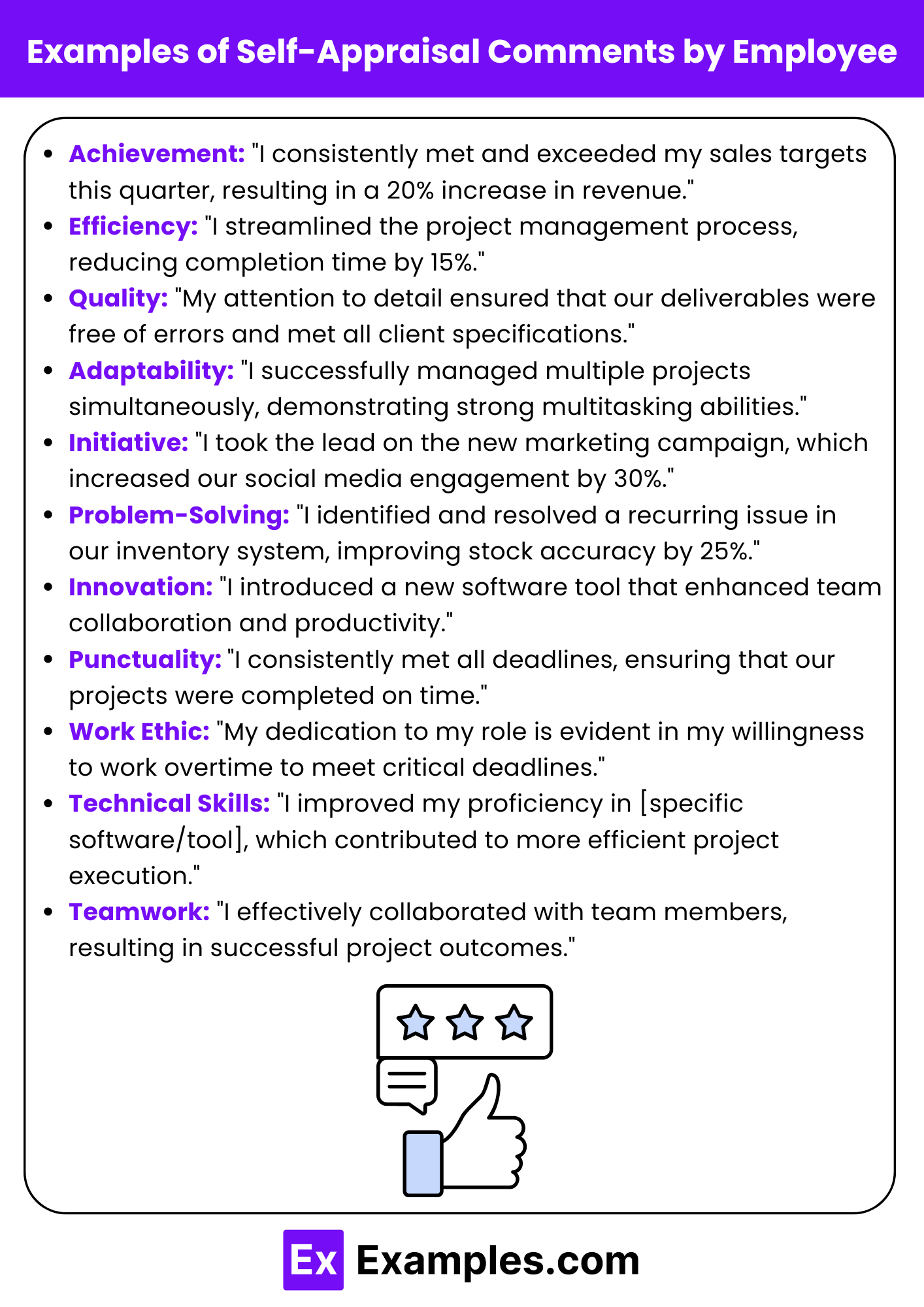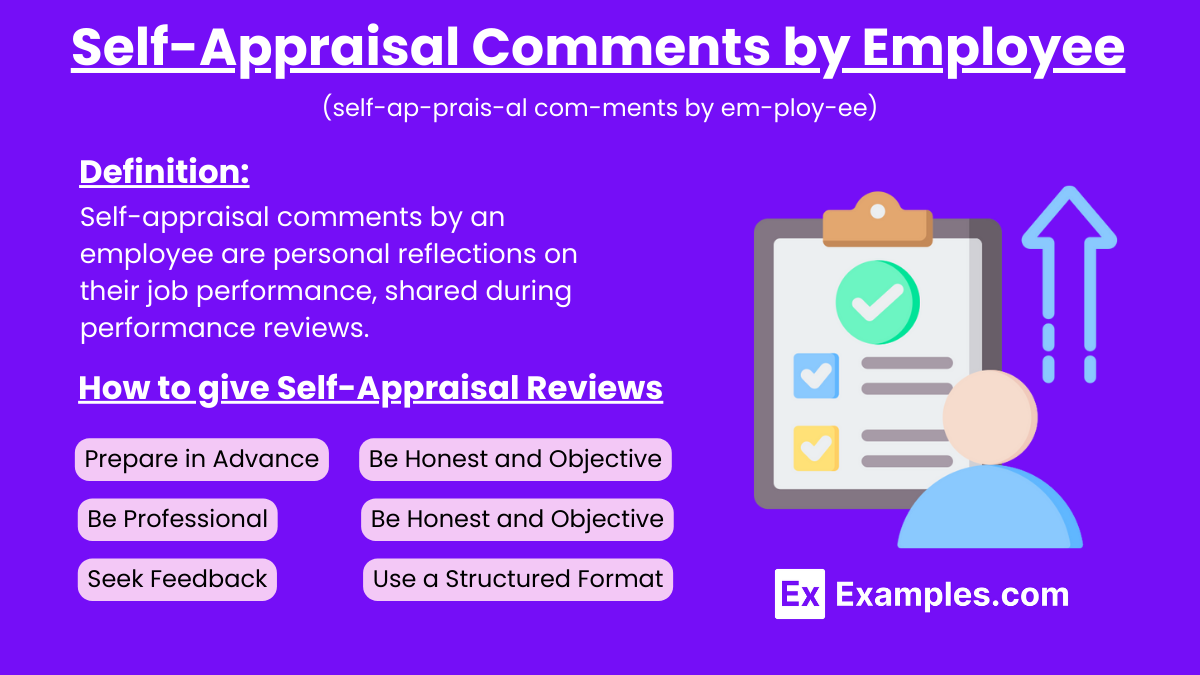49+ Self-Appraisal Comments by Employee Examples
Performance appraisal is a crucial process in any organization, serving as a comprehensive evaluation of an employee’s job performance over a specific period. Employee self-appraisal is an integral part of this process, allowing individuals to reflect on their achievements, areas for improvement, and career aspirations. Through thoughtful performance review comments, employees can provide valuable insights into their work, fostering a culture of transparency and continuous growth. Effective self-appraisal comments not only highlight accomplishments but also demonstrate a commitment to personal and professional development.
What is Self-Appraisal Comments by Employee?
Self-appraisal comments by an employee are personal evaluations and reflections on their own job performance, achievements, and areas for improvement, typically shared during performance reviews.
Examples of Self-Appraisal Comments by Employee

Performance and Productivity
- Achievement: “I consistently met and exceeded my sales targets this quarter, resulting in a 20% increase in revenue.”
- Efficiency: “I streamlined the project management process, reducing completion time by 15%.”
- Quality: “My attention to detail ensured that our deliverables were free of errors and met all client specifications.”
- Adaptability: “I successfully managed multiple projects simultaneously, demonstrating strong multitasking abilities.”
- Initiative: “I took the lead on the new marketing campaign, which increased our social media engagement by 30%.”
- Problem-Solving: “I identified and resolved a recurring issue in our inventory system, improving stock accuracy by 25%.”
- Innovation: “I introduced a new software tool that enhanced team collaboration and productivity.”
- Punctuality: “I consistently met all deadlines, ensuring that our projects were completed on time.”
- Work Ethic: “My dedication to my role is evident in my willingness to work overtime to meet critical deadlines.”
- Technical Skills: “I improved my proficiency in [specific software/tool], which contributed to more efficient project execution.”
Communication and Collaboration
- Teamwork: “I effectively collaborated with team members, resulting in successful project outcomes.”
- Communication: “My clear and concise communication helped prevent misunderstandings and ensured smooth project execution.”
- Listening: “I actively listened to colleagues’ feedback and incorporated their suggestions into our projects.”
- Conflict Resolution: “I effectively mediated conflicts within the team, fostering a positive work environment.”
- Networking: “I built strong relationships with key stakeholders, enhancing our project’s visibility and support.”
- Mentorship: “I provided guidance and support to junior team members, helping them develop their skills.”
- Feedback: “I consistently provided constructive feedback to colleagues, contributing to their professional growth.”
- Presentation Skills: “My presentations were well-organized and effectively communicated key points to the audience.”
- Customer Service: “I maintained positive relationships with clients, ensuring their satisfaction with our services.”
- Cross-Departmental Collaboration: “I successfully coordinated efforts between different departments to achieve our project goals.”
Leadership and Management
- Leadership: “I effectively led my team through challenging projects, ensuring successful outcomes.”
- Decision-Making: “I made informed decisions that positively impacted our project’s progress and success.”
- Delegation: “I delegated tasks appropriately, leveraging team members’ strengths to achieve our objectives.”
- Motivation: “I motivated my team to achieve high performance, resulting in a 10% increase in productivity.”
- Vision: “I developed a clear vision for our project, aligning team efforts towards common goals.”
- Strategic Planning: “I created and executed strategic plans that contributed to the long-term success of our projects.”
- Crisis Management: “I effectively managed crises, minimizing their impact on our project timelines.”
- Resource Management: “I efficiently allocated resources, ensuring that our projects were completed within budget.”
- Coaching: “I provided valuable coaching to team members, helping them enhance their skills and performance.”
- Recognition: “I consistently recognized and celebrated team members’ achievements, boosting morale and motivation.”
Professional Development and Growth
- Learning: “I actively sought out learning opportunities to enhance my skills and knowledge.”
- Certifications: “I earned [specific certification], which has enhanced my expertise in [relevant area].”
- Goal Setting: “I set and achieved professional development goals that contributed to my career growth.”
- Self-Improvement: “I consistently sought feedback and made improvements to enhance my performance.”
- Adaptability: “I quickly adapted to new challenges and changes in our work environment.”
- Time Management: “I improved my time management skills, allowing me to complete tasks more efficiently.”
- Networking: “I expanded my professional network, which has opened up new opportunities for collaboration.”
- Work-Life Balance: “I maintained a healthy work-life balance, which has improved my overall productivity and well-being.”
- Professionalism: “I consistently demonstrated professionalism in all interactions with colleagues and clients.”
- Career Progression: “I took on additional responsibilities that have prepared me for future leadership roles.”
Areas for Improvement
- Communication: “I aim to improve my communication skills to ensure clearer and more effective interactions with colleagues.”
- Technical Skills: “I plan to enhance my proficiency in [specific software/tool] to contribute more effectively to our projects.”
- Time Management: “I will work on better prioritizing tasks to ensure timely completion of all assignments.”
- Public Speaking: “I am committed to improving my public speaking skills to deliver more impactful presentations.”
- Delegation: “I aim to delegate tasks more effectively to empower my team and enhance productivity.”
- Stress Management: “I will develop better stress management techniques to maintain high performance under pressure.”
- Feedback: “I plan to seek more feedback from colleagues to continuously improve my performance.”
- Networking: “I aim to build stronger relationships with industry professionals to enhance our project’s success.”
- Leadership: “I will work on developing my leadership skills to take on more significant roles within the team.”
- Innovation: “I plan to foster a more innovative mindset to contribute fresh ideas and solutions to our projects.”
How to give Self-Appraisal Reviews?
1. Prepare in Advance
- Gather Documentation: Collect any relevant documents, such as performance reports, project summaries, feedback from colleagues, and emails that highlight your contributions.
- Review Job Description: Revisit your job description to ensure your self-appraisal aligns with your roles and responsibilities.
2. Reflect on Your Performance
- Assess Achievements: Identify your key accomplishments over the appraisal period. Focus on specific, measurable outcomes.
- Evaluate Areas for Improvement: Consider any challenges you faced and areas where you can enhance your skills or performance.
3. Be Honest and Objective
- Balanced View: Provide a balanced view of your performance, highlighting both strengths and areas for growth.
- Specific Examples: Use specific examples to illustrate your points. Quantify your achievements wherever possible.
4. Use a Structured Format
- Introduction: Begin with a brief overview of your appraisal period, mentioning any significant projects or responsibilities.
- Achievements: Detail your major accomplishments, focusing on their impact on the team or organization.
- Challenges: Discuss any challenges you encountered and how you addressed them.
- Goals: Outline your professional development goals and plans for the future.
5. Highlight Key Competencies
- Skills and Abilities: Emphasize the skills and abilities that are most relevant to your role.
- Professional Growth: Mention any new skills you have acquired and how they have contributed to your performance.
6. Seek Feedback
- Collaboration: Highlight any feedback you received from colleagues, supervisors, or clients and how you incorporated it into your work.
- Improvement: Mention how you plan to seek further feedback to continue improving your performance.
7. Be Professional
- Positive Tone: Maintain a positive and professional tone throughout your self-appraisal.
- Constructive Language: Use constructive language when discussing areas for improvement, focusing on solutions and growth opportunities.
8. Set Future Goals
- Short-term Goals: Set achievable short-term goals that align with your current role and responsibilities.
- Long-term Goals: Identify long-term career aspirations and the steps you plan to take to achieve them.
Purpose of Self-Appraisal Comments by Employee
1. Self-Reflection
- Personal Insight: Employees reflect on their own performance, gaining insights into their strengths and areas for improvement.
2. Enhanced Communication
- Dialogue Starter: Self-appraisal comments open the door for meaningful conversations between employees and supervisors.
3. Employee Engagement
- Empowerment: Involving employees in the appraisal process makes them feel valued and engaged.
4. Goal Setting and Planning
- Future Goals: Employees can outline their career aspirations and set future goals in alignment with their self-assessment.
5. Performance Documentation
- Record of Achievements: Self-appraisals provide a documented record of an employee’s achievements and contributions over a specific period.
6. Improved Performance Reviews
- Balanced Evaluation: Including Employee Self-Appraisal comments ensures a more balanced and comprehensive performance review process.
7. Alignment with Organizational Goals
- Goal Alignment: Self-appraisal helps ensure that individual performance aligns with the organization’s objectives and goals.
Why are self-appraisal comments important?
They are important because they enhance communication during performance reviews and allow employees to take an active role in their own performance evaluation.
How can I write effective self-appraisal comments?
Be honest, specific, and use examples. Highlight your achievements and areas for growth to provide a balanced self-review during your employee performance evaluation.
Should self-appraisal comments focus only on achievements?
No, they should also address challenges and areas for improvement. This ensures a comprehensive self-review and helps in personal development.
How do self-appraisal comments benefit the organization?
They provide valuable insights for managers during performance reviews, helping to align employee goals with organizational objectives and improve overall employee performance evaluation.
Can self-appraisal comments impact my career growth?
Yes, well-crafted self-review comments can highlight your strengths and readiness for new opportunities during performance evaluations, aiding career advancement.
How often should I write self-appraisal comments?
Typically, self-appraisals are written annually or semi-annually, aligning with your organization’s performance review schedule.
What should I avoid in self-appraisal comments?
Avoid vague statements and negativity. Focus on specific examples and maintain a constructive tone to make your performance review productive.
Can self-appraisal comments be used for setting future goals?
Yes, they are an excellent tool for identifying areas for growth and setting actionable goals during employee performance evaluations.
How detailed should my self-appraisal comments be?
Provide enough detail to give a clear picture of your performance, but be concise. Balance is key for an effective self-review.
Can self-appraisal comments help with identifying training needs?
Yes, they can highlight areas where you need further development, which can be addressed in your performance review and training plans.



